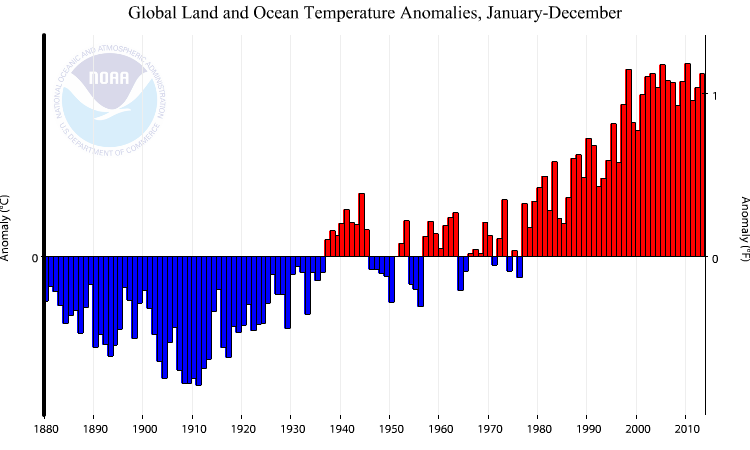Today, NOAA announced another startling record-breaking month of elevated global temperatures. We have just experienced the hottest October since record keeping began 135 years ago. This year, May, June, August, September and now October – half the months so far – all smashed previous records for global land and ocean temperatures.
According to NOAA, “The January–October combined global land and ocean average surface temperature was the warmest such period on record, surpassing the previous record set in 1998 and 2010.”
This visualization shows how global temperatures have risen from 1950 through the end of 2013. Source: NASA/GSFC, GISS
Nine of the ten hottest years on record are since the year 2000
Over the last half century, global average temperatures have continued to climb. Here are some astounding statistics:
- Nine of the world’s top ten warmest years have occurred since the year 2000
- There has not been a monthly cold record set since 1916
- October was the 356th month in a row with global average temperature above the 20th century average
- 2014 will be the 38th consecutive year above global average temperature
This means if you are a young person in your 30s you have never experienced an average year, but have spent your whole life in a warmer world.
Years in which El Niño amplifies warming are usually the hot ones – not this year
However, 2014 is different from other recent record-breaking years. So far, it is happening without the influence of an El Niño event, which usually brings warmer weather. The warming of the tropical central and eastern Pacific Ocean during an El Niño affects weather in many parts of the world, and was present during the scorching years of 1998, 2005, and 2010 – the top three in the list. This year El Niño has not made its presence felt yet, and NOAA has lowered the odds of it happening, but temperatures still remain high – a harbinger that the paradigm may be shifting. It seems that regardless of what happens with the natural ocean variations, human-caused warming is now clearly dominating the climate system.
2014 will likely add another peak in the global temperature curve, largely as a result of warming due to heat-trapping emissions from human activity over the last half century. As the headline statement from the IPCC 5th Assessment Report made clear several weeks ago, human activity is “extremely likely to have been the dominant cause of the observed warming since the mid 20thcentury.”
Toward a solution
To avoid a future where we continue to relentlessly break temperature records, we need to deeply and swiftly reduce our heat-trapping emissions. The historic climate agreement last week between the U.S. and China could start us on that road.

